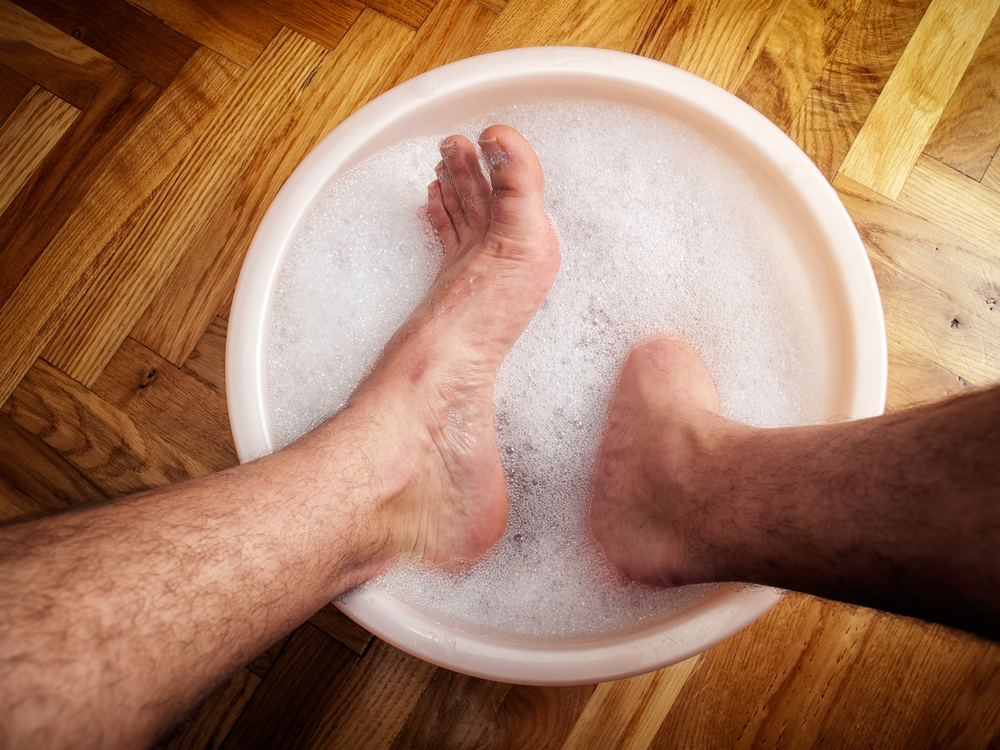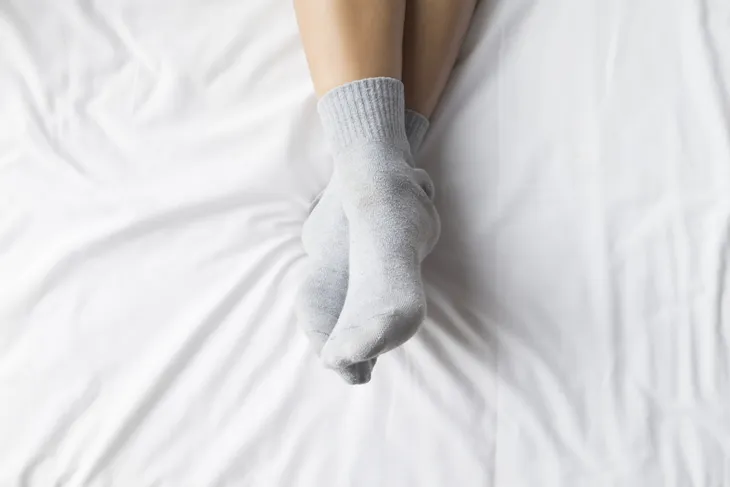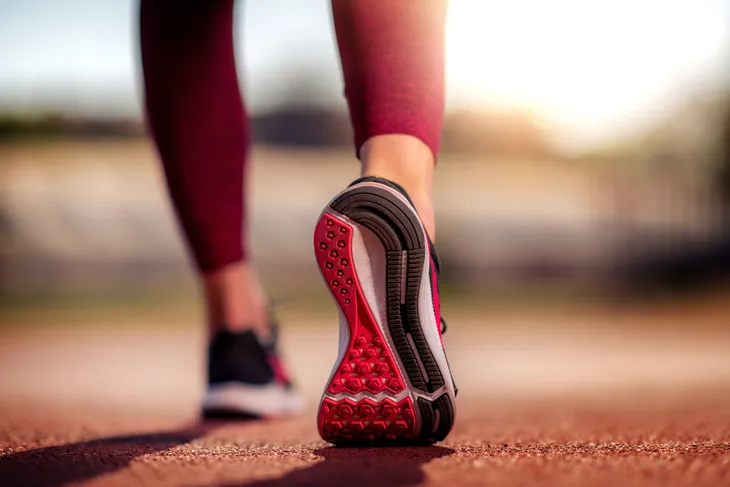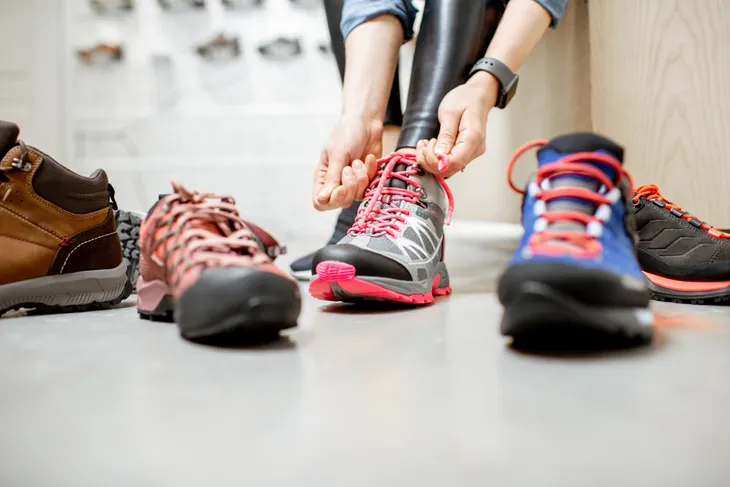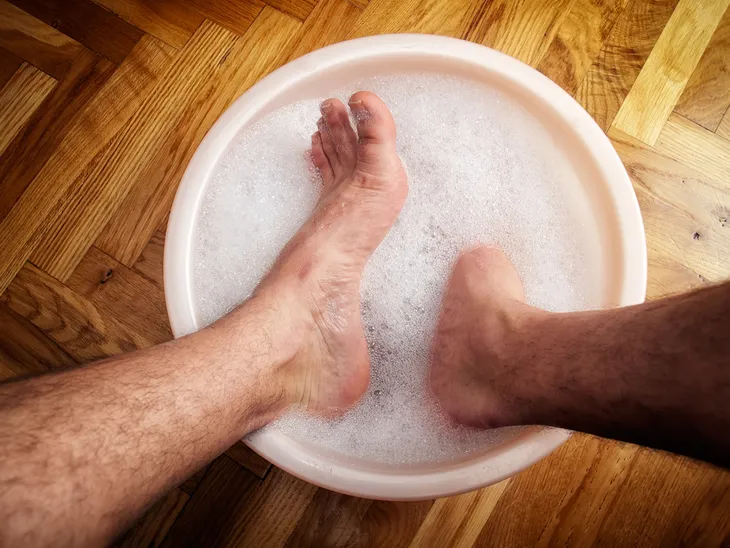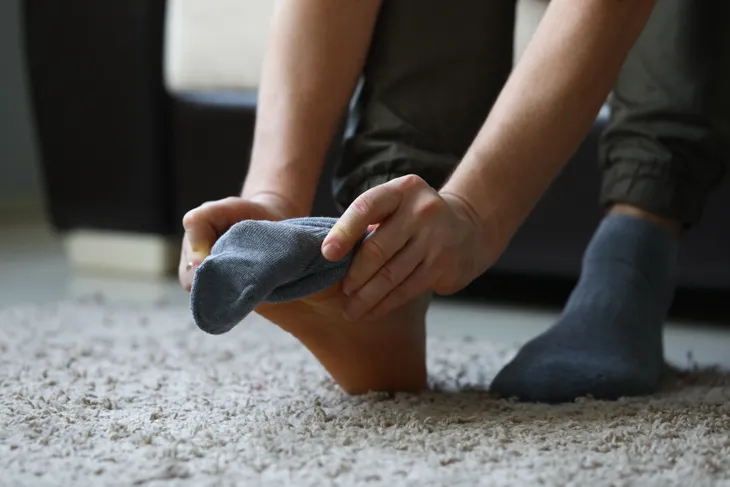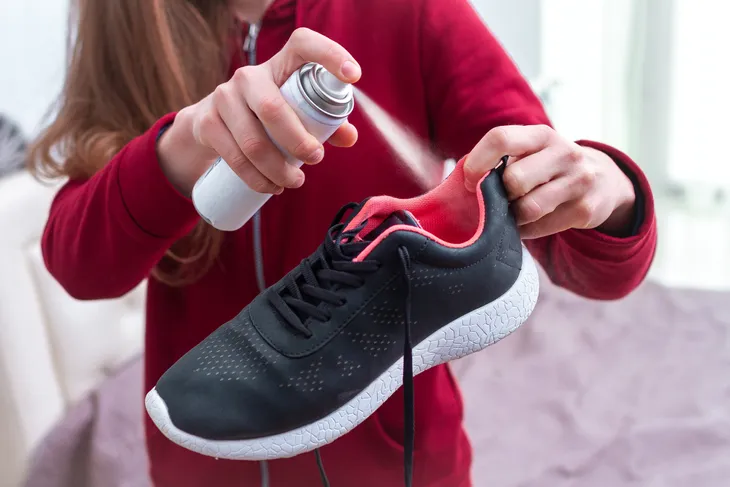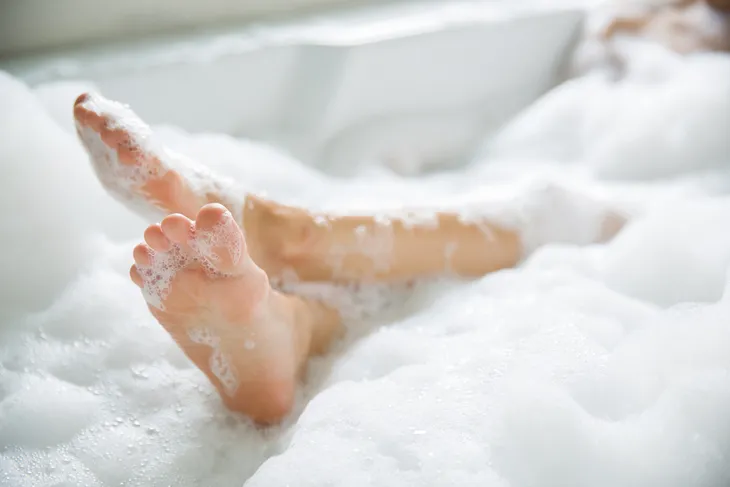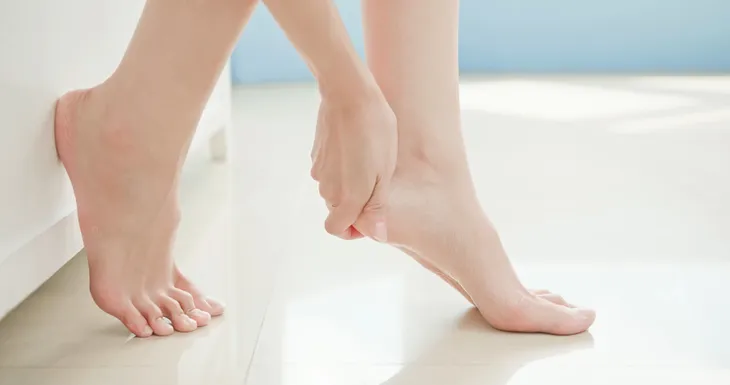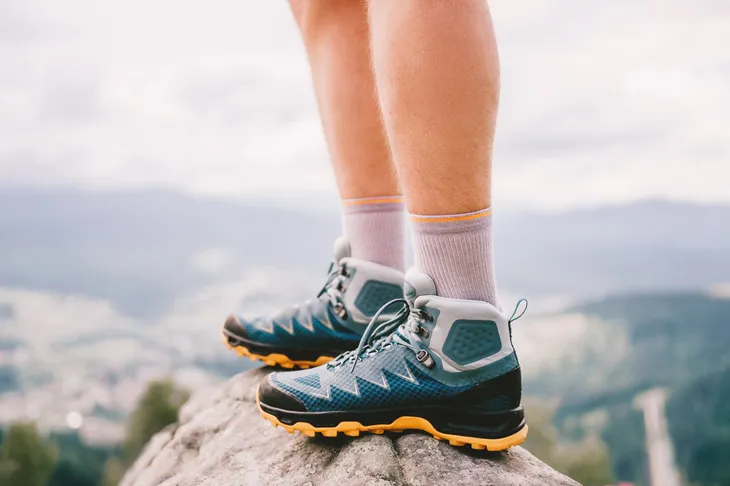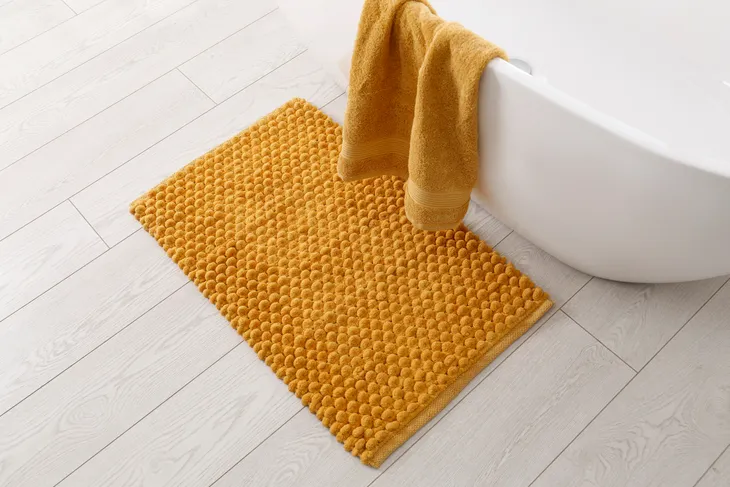Keeping your socks on around others. Spraying your closet with air freshener. Avoiding sandals, even when it’s hot. If you’ve ever had smelly feet and especially if it happens often, odds are you’ve tried one or several of these tricks to try to reduce the smell in your shoes and on your feet, cover it up, or hide it from those around you. Unfortunately, many of these tricks simply delay the inevitable or don’t work at all. Smelly feet aren’t something people like to advertise or discuss, but it’s a common problem. And it’s not just something athletes or those with manual jobs have; anyone is at risk.
The good news is there are many effective solutions for preventing smelly feet. So get ready to take a deep breath—without worrying what you’ll smell—and check out these ten fixes for smelly feet…
1. Wear the Right Socks
Smelly feet are often caused by bacteria that forms as a result of your feet sweating, and choosing the right socks to wear can help reduce that sweat—and in turn, the unpleasant odor. To help your feet breathe when wearing socks, go for materials like cotton or wool that naturally allow more air to get through, keeping your feet cooler. Avoid synthetic socks like polyester, which can stifle your feet, leading to excess sweat that gets trapped and encourages the growth of bacteria.
On top of breathable materials to look for, there are active or sportswear socks that are not only made of the right material, but contain special ventilation materials strategically placed in areas prone to sweat. There’s a common misconception that the color of socks can affect whether or not they’ll make you sweat more, which stems from the notion that dyes can make socks less breathable and cause feet to sweat. But you can’t base your sock shopping on color because white socks are dyed too, so pay attention to the material and style instead.
2. Wash Running Shoes
Not all shoes can be washed, but it’s worth checking if the sneakers you wear can be. And next time you’re in the market for running shoes or if you can swing buying another pair now, look specifically for shoes that can be washed. Many sports stores offer washable styles because the fact is, if you’re active and spend a lot of time in your sneakers, your whole body, including your feet, is going to sweat.
Being able to wash the shoes you spend a lot of time in as they absorb your sweat will help fix and prevent smelly feet. Even if you don’t work out regularly or spend tons of time in your running shoes, some people simply sweat more. And the sweat that’s absorbed into the materials that encase your feet can lead to a really unpleasant odor from the bacteria that take up residence in your shoes. Washing your running shoes in hot water every month or so can help rid your shoes of the smell, which can go a long way in fixing smelly feet.
3. Rotate Shoes
If you’re looking for an excuse to buy another pair of shoes, you have one! Rotating the shoes you wear can fix and prevent foot odor. Everyone should have more than one pair of shoes that they wear on a regular basis to give them a chance to air out, as well as dry if your feet have been sweating in them. The longer shoes are damp, the better chance of bacteria growing and causing both your feet and shoes to smell.
The type of shoes you wear impacts whether or not they’ll cause smelly feet. But we don’t live in a perfect world and often you’re limited in what options you have for shoes depending on your job and extra-curricular activities. So your best bet, other than wearing the best breathable shoes and avoiding boots whenever possible, is to find a few pairs that work best for your situation and alternate pairs every day.
4. Soak Feet in Epsom Salts
Smelly feet can be difficult to effectively clean and get the odor completely off of your skin. Often a shower isn’t enough, even when you spend a lot of time scrubbing at your feet with a cloth and an excessive amount of soap. And scrubbing at your feet will end up making them dry and a little raw, adding another layer to your foot problems. Instead of intense scrubbing, try fixing your smelly feet by soaking them in a simple mixture of hot water and Epsom salts.
Epsom salts are essentially magnesium and sulfate, which have been around for generations. Epsom salts are known for their natural healing properties, soothing scents, and hydrating benefits to your skin. By soaking your feet—or even your whole body—in warm water that contains Epsom salts, you could break through the foot odor and enjoy the other benefits of the healing salts. Follow the ratio for water to Epsom salts on the packaging and soak your feet up to 3 times a day, depending on how smelly they are.
5. Change Socks Twice a Day
If you’ve ever had smelly feet, you know that sometimes you just can’t help it if your feet sweat. Unfortunately, it’s just the way it is for some people. That doesn’t mean you need to be uncomfortable or deal with super smelly feet on a regular basis. By changing your socks a twice a day (or more), you can prevent the bacteria from growing and stinking up your feet, catching it before it really sets in, or at least reducing the smell.
Stuff some extra socks in your car, gym bag, purse, office drawer, and anywhere else that will help you make a quick change on the go. Although it’s glaringly obvious to many, you should also make sure you put on a clean pair of socks every time you change them. Bacteria will remain in your socks until they’ve been cleaned, so putting on a dirty pair—even for just a few hours in the morning as you run errands—can cause some terrible odors and make changing your socks pointless.
6. Use Deodorizing Powder or Antiperspirant
Believe it or not, there is actually special deodorizing powder and antiperspirant for your feet. It works just like the deodorant you use on your armpits, providing protection from sweat and in turn, bacteria that causes odor. Deodorizing powders typically go in your shoes and work as a way to wick moisture throughout the day. Many products last all day, letting your drop some in when before you get going and allowing you to not worry about adding more throughout the day.
For antiperspirants, many products used in your armpits work on feet and other areas of the body, though some contain ingredients that work better than others. This is good news, since you won’t need to fork out a lot of money for a product that might not work the best for you. Ask your doctor or a dermatologist about it to make sure you have the right product. In general, the antiperspirant should help decrease the amount your feet sweat because it will block your pores from sweating, just like it does under your arms.
7. Use Antibacterial Soaps
Sweaty feet are unpleasant to deal with, especially if you’re stuck with them sweating for hours or the whole day at work with no way to keep them dry or prevent the odor from developing. When you clean your feet though, it’s not just the remnants of the sweat that needs to come off—t’s the bacteria—and for some, effectively washing off the smelly bacteria can be difficult. To clean your feet well and to get rid of bacteria, use an antibacterial soap on your feet when you shower or bath.
You don’t have to use the antibacterial soap on the rest of your body, but it will clean your feet well. Remember to dry your feet thoroughly after the shower, including between your toes. For times when you come home and your feet are smelly, just wash your feet with the soap in the tub or shower to help get rid of the odor. By adding an antibacterial soap to your daily cleansing process, you can properly clean your feet and cut through the bacteria that causes the smell.
8. Use Oils
On top of Epsom salts and other salt soaks available, there are many oils you can soak your feet in that provide natural relief for foot odors. Use oils either your bathtub or a basin big enough for your feet. Fill it with warm water and add a few drops of oil. Some people recommend adding black tea bags as well. Lavender oil can be rubbed directly onto your feet to kill bacteria. Just make sure you put on socks or slippers afterward to avoid slipping or staining your carpet (and allowing the oil to soak in and do its job).
Many oils also have antimicrobial properties, including tea tree, thyme, eucalyptus, and peppermint. Not all oils have these amazing benefits, but a surprising amount of essential oils have not only antimicrobial properties but anti-inflammatory and anti-fungal properties, all of which can benefit your feet and health. The relaxing, natural scent is another bonus. Oils are inexpensive to buy, plus they work well, and provide a natural option for fixing smelly feet, so they’re worth giving a try.
9. Wear Socks with Shoes
It’s true that some socks can increase the amount your feet sweat, trapping moisture that leads to bacteria and odor, so it may be surprising to know that wearing socks can actually fix smelly feet. How? People who wear closed-shoes like sneakers, dress shoes, and boots without socks can end up with some pretty foul odors because a good portion of shoes aren’t any more breathable than socks. Add in the fact that you don’t wash your shoes after each use like you do socks, and there can be a ton more bacteria as you go barefoot in them.
The whole going sock-less in running shoes probably stemmed from the idea that if your feet breathe easier and sweat less in sandals, the same would hold true for other types of shoes. But it may even make it worse. If you find your feet are sweaty by early afternoon, instead of skipping socks you should keep a few fresh pairs in your car or at work. By switching into something fresh partway through the day it could be more comfortable and make wearing socks with closed-shoes more tolerable.
10. Dry Feet Thoroughly
It’s common to jump in and out of the shower, hastily drying the body (especially feet) to cut back on the amount of time needed to get ready. While you might not mind throwing clothes over your damp body because it will dry fairly quickly or if you’re simply forced to because you’re running late, it could be the cause of or contributing to your foot odor. So an easy fix for smelly feet is to ensure you dry your feet thoroughly after they’ve been wet, including between your toes.
Although it might be obvious for some, this fix doesn’t just apply for after a shower or bath; you should dry your feet well after swimming, getting your shoes or boots wet outdoors, and after workouts. Whenever your feet get wet or damp, from water or sweat, odor could occur by walking around with that dampness. Drying your feet—even between your toes—really doesn’t take long, but could make a big difference by reducing the chance of bacteria growing from the moisture on your feet.
